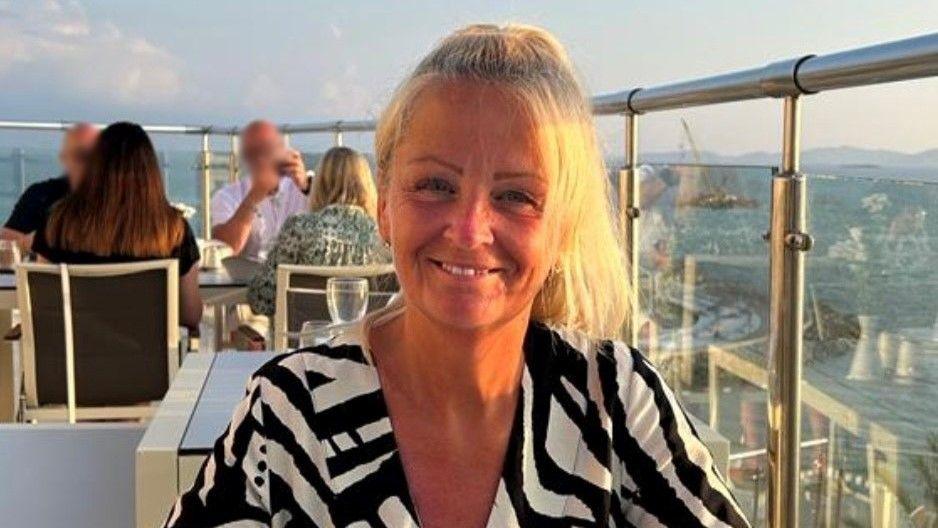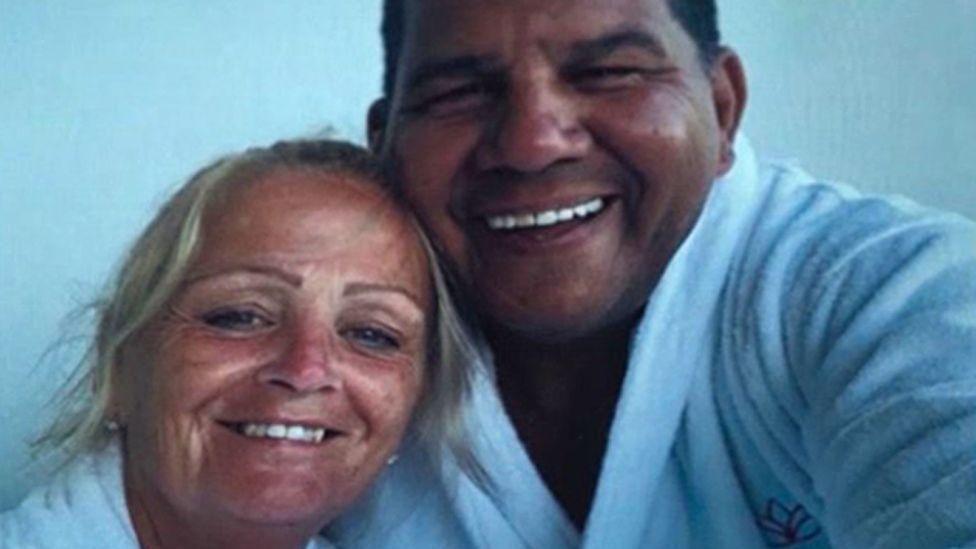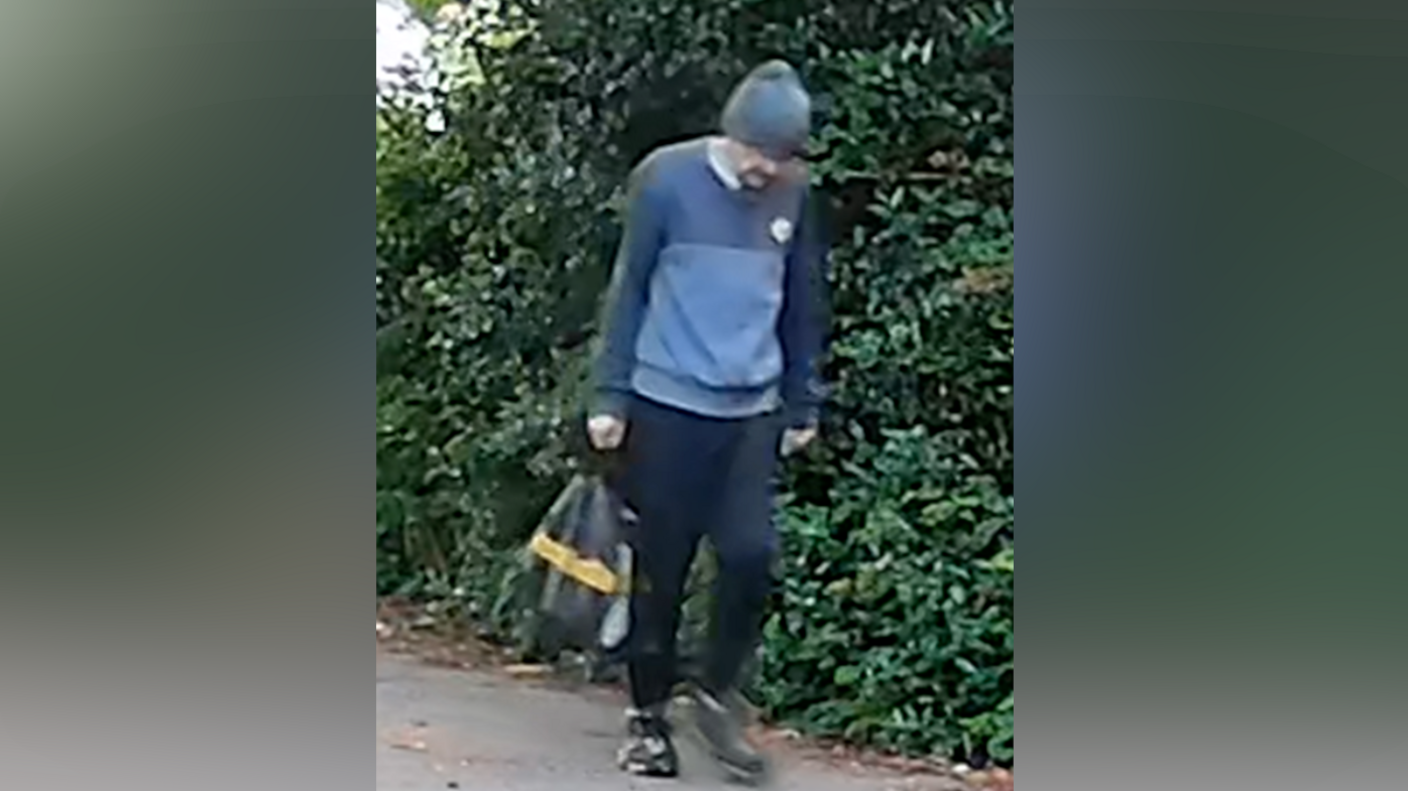Fugitive jailed for murder of mother walking dog

Roy Barclay has been jailed for a minimum of 25 years for the murder of Anita Rose
- Published
A dangerous fugitive who savagely murdered a woman while she was walking her dog has been jailed for life.
Roy Barclay had been on the run from police for two years when he attacked Anita Rose, 57, on a footpath in Brantham, Suffolk, on 24 July last year. Ms Rose died four days after she was found with serious injuries.
Barclay, 56, of no fixed address, was sentenced to a mandatory life term – and will serve a minimum of 25 years – after being found guilty of murder following a trial at Ipswich Crown Court.
Judge Martyn Levett told the killer there were still unanswered questions about his motive.

Anita Rose died after being attacked while walking her dog near Brantham, Suffolk
On the day she was attacked, Ms Rose left her house at about 05:00 BST.
She was found less than two hours later by members of the public on a track off Rectory Lane next to the London-Ipswich railway line.
Her springer spaniel Bruce was found with his lead wrapped around her leg – something Barclay had also done during a previous incident in 2015.
The mother-of-six had suffered serious injuries after being kicked and stamped on, and she died four days later in Addenbrooke's Hospital, Cambridge.
The killer's DNA was discovered on Ms Rose's jacket and on the earbuds of her headphones.
Barclay was finally caught after he was spotted in Brantham by a police officer.
When questioned, he initially gave the false name of John Lesley, but he provided his real telephone number and police were able to ascertain his true identity.
Several days later, he was arrested at Ipswich County Library and subsequently charged with Ms Rose's murder.
The trial heard he had been living in a makeshift camp in the area while "on the run" from police for two years following an earlier attack.
Prosecutors said he also kept some of Ms Rose's belongings as trophies.

A statement from Richard Jones, Anita Rose's partner, was read during the hearing
At the time of the attack, Barclay had been wanted on recall to prison having breached the conditions of his licence.
He had previously been jailed for attacking an 82-year-old man in Walton-on-the-Naze, Essex, 10 years ago.
During that attack, he had similarly left a dog lead wrapped around his victim's leg.
Ms Rose's family were in court for Wednesday's sentencing.
Prosecutor Christopher Paxton KC outlined 11 aggravating factors for the judge to consider in his sentencing.
These included Barclay's use of "sustained and excessive violence", killing in public, and the taking of Ms Rose's property.
Mr Paxton said the defendant had also broken the conditions of the licence of his parole following the 2015 attack.
Simon Spence KC, mitigating, said Barclay's actions were not premeditated – something which Judge Levett agreed with.
Barclay sat emotionless as he listened from the dock.

Barclay had been captured on CCTV in the Brantham area on the day Anita Rose was attacked
The court heard how Ms Rose had enjoyed living in Brantham and had helped neighbours and vulnerable residents when they were in need.
Statements from several of her children were read out to the court.
They talked of their mother's love for walking and how she was the centre of their family.
Her partner, Richard Jones, described how the couple "planned to grow old together", and how he had been haunted by her death
Her daughter, Gemma, described the "immeasurable" loss and revealed she had taken to telling her own children about "how dangerous the world is" in an effort to protect them.
One of Ms Rose's sons, Ashley, told the court how he had desperately tried to help the investigation by buying a drone to find some of his mother's personal items that had been missing and were later found in Barclay's possession.
The judge said Barclay was an "unpredictable, dangerous" man who was "prone to terrible outbursts of violence at the slightest confrontation".
He highlighted how in the 2015 attack on a "helpless" 82-year-old, he had beaten the pensioner for 53 seconds, causing severe injuries.
Barclay served only five years in prison for that offence before he was released on parole, but Judge Levett told him that should have been enough time for him to work on his "temper".
When Barclay breached the conditions of his licence in 2022, he became a wanted man, and he was on the run from police.
Watch: How a man who murdered a woman was caught
Judge Levett also questioned why Barclay had chosen to remain silent by not answering police questions when he was arrested or why he did not give evidence in his trial.
He said Barclay was "still, and will remain, for an unpredictable length of time, this dangerous person".
"We will, perhaps, never know what triggered this outburst of violence against Anita," he added.
"It may have been her challenging you about what you were doing, she may have caught you doing things which caused offence, but I am satisfied so as to be sure that, for whatever reason, at the time of the incident your intention was to kill Anita and not simply to cause her really serious harm."
Barclay had previously pleaded guilty to remaining at large after being recalled to prison.
For this, he was sentenced to 12 months in prison, which will run concurrently with his life sentence for murder.
'Cunning'
Det Ch Insp Matthew Connick, the senior investigating officer on the case, said after the hearing that Ms Rose had been subjected to the most "shocking and violent attack".
"Roy Barclay was a deceitful and violent man who lived off-grid and in solitude," he said.
"Three days after the attack, he left Anita's phone in Ipswich, enabling it to fall into the hands of others while causing a distraction and diverting significant resources. This ultimately led to his downfall with further CCTV obtained capturing his actions."
Nicola Pope, of the Crown Prosecution Service, said the attack was "savage".
"[Barclay] thought he was too cunning to be caught, but a unanimous guilty verdict proved otherwise," she said.
"By carefully building a case with DNA recovered from Anita's belongings and sightings on CCTV – combined with previous bad character evidence against Barclay – we were able to present a clear picture to the jury."
Get in touch
Do you have a story suggestion for Suffolk?
Follow Suffolk news on BBC Sounds, Facebook, external, Instagram, external and X, external.
- Published24 July

- Published9 July

